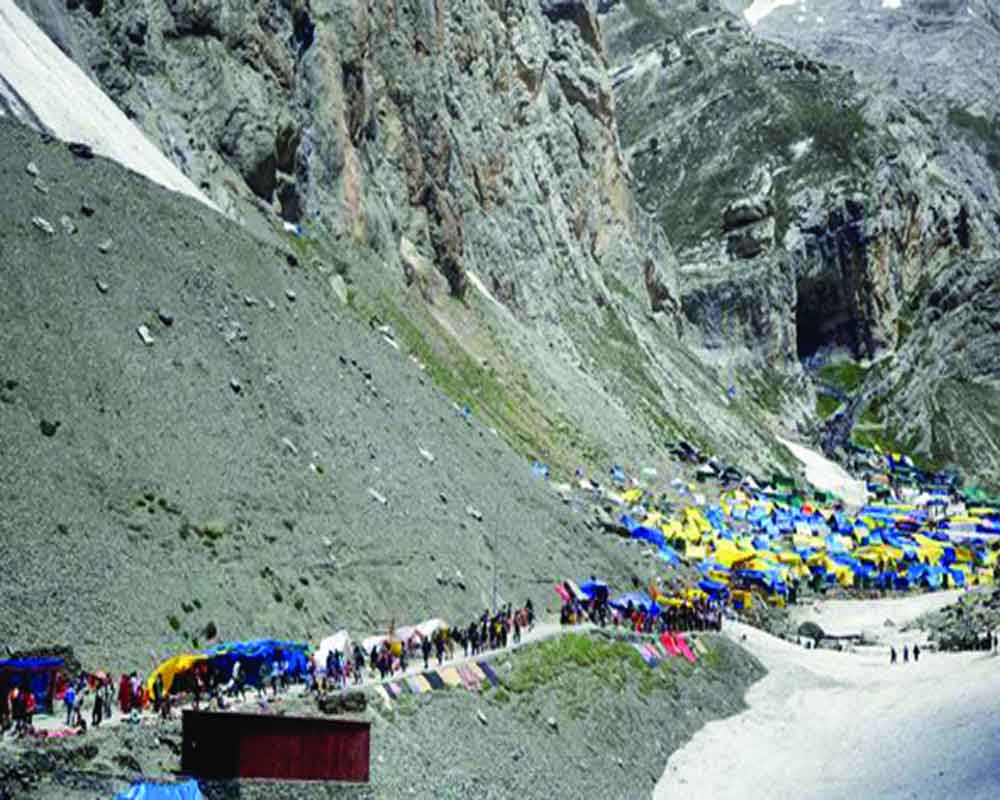Amit Shah reviews security for smooth Amarnath pilgrimage
The Amarnath pilgrims will be provided with Radio Frequency Identification (RFID), Rs 5 lakh insurance each, and better mobile connectivity as the Government on Tuesday reviewed the security situation for a hassle-free yatra.
Union Home Minister Amit Shah held a series of meetings with security and intelligence top brass along with Jammu & Kashmir’s senior officials to assess the prevailing situation and recent targeted killings in the valley.
According to officials, the Union Territory administration proposed RFID tags to every pilgrim to ensure complete protection.
Lt Governor of J&K Manoj Sinha was present in all the three back-to-back meetings chaired by the Home Minister. National Security Adviser Ajit Doval and Army Chief Gen Manoj Pande attended the meetings to discuss the security situation in the UT. Senior officials from the Centre, para-military forces and the UT administration were present in these meetings.
Later in a statement, the Union Home Ministry said the J&K Chief Secretary informed the meeting that each pilgrim will be provided with a RFID and will be insured for Rs 5 lakh.
Shah said a “hassle-free” journey for the pilgrims is a priority of the Modi Government and directed that all arrangements, including additional electricity, water, and telecom facilities be made. He directed for the enhancement of mobile connectivity along the Yatra route and suggested that earth moving equipment should be placed at vantage points to clear the route in case of landslides.
This is the first Yatra after the Covid-19 pandemic, and due to the high altitude, adequate arrangements will have to be made for yatris who have any health-related problems, he said.
Shah asked for an adequate number of oxygen cylinders, medical beds at an altitude of more than 6,000 feet, and deployment of ambulances and helicopters to deal with any emergency medical situation. All categories of transport services should be increased during the Amarnath yatra for the convenience of passengers.
During the meeting, it was also decided to enable WiFi hotspots to ensure connectivity throughout the 39 km of the Yatra route from Pahalgam in South Kashmir. The other route is through Baltal in Central Kashmir where a pilgrim treks for nearly 15 km.
The Yatra, which presents a big security challenge to the Government, could not take place in 2020 and 2021 due to the coronavirus pandemic and was cut short in 2019 just before the abrogation of Article 370.
About three lakh pilgrims are likely to take part in the pilgrimage, scheduled to begin on June 30 and expected to end on August 11.
About 12,000 paramilitary personnel (120 companies) in addition to Jammu and Kashmir Police are expected to be deployed along the two pilgrimage routes, officials said. Drone cameras will help the security forces to ensure the protection of the pilgrims.
Besides the Amarnath pilgrimage, the meetings also reviewed the security arrangement especially in the wake of several targeted killings, including of Kashmiri Pandits, in Kashmir. Top officials of the Ministries of Health, Telecom, Road Transport, Civil Aviation and IT took part in the meeting to discuss logistics for the annual pilgrimage to the cave shrine dedicated to Lord Shiva at an altitude of 3,888 metres.


























